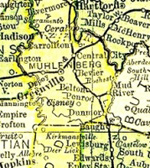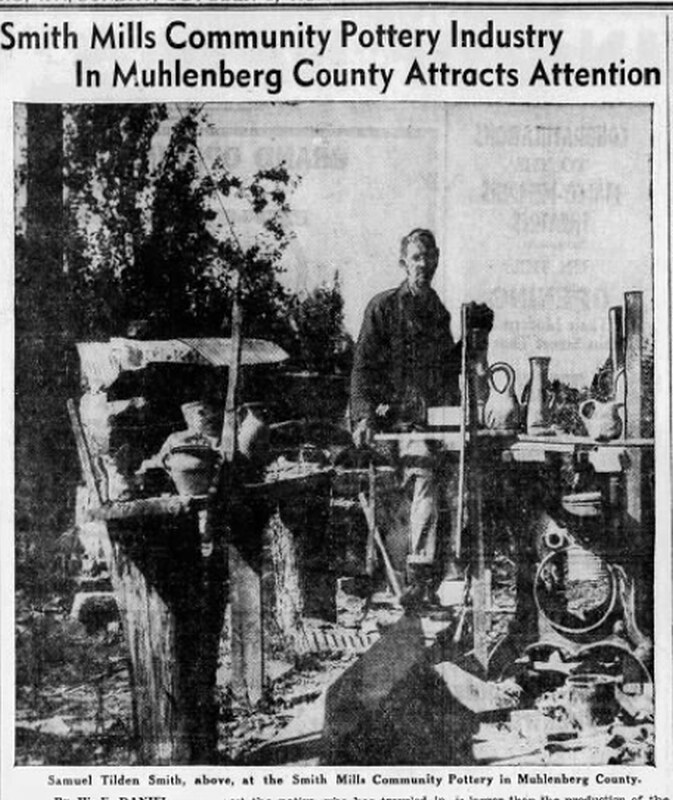Muhlenberg County Kentucky

Local History: S
Smith Mills Community Pottery Industry In Muhlenberg County Attracts Attention

Rockport, Ky., Oct. 7.-A stranger driving from this Ohio county town to Paradise, a few miles up Green river, would be struck with the picturesqueness of the scenery as he crosses the ferry into Muhlenberg, but unprepared for the unique industry that Samuel Tilden Smith is developing on the wooded heights four miles south.
Passing through the fertile lowlands he could observe the herd of white-faced cattle on the Rogers Brothers farms which spread over 2,000 acres; the modern farmstead with a group of buildings adjacent to the home; the wide corn fields wherein huskers are now busy; the broad meadows, and then a bridge over Pond creek, just beyond which is a large frame house, a barn of corresponding size and the site of the original Smith Mills Community pottery.
For a century a water wheel turned the machinery in the Smith mill, dismantled in 1896, and now the sign pointing toward the pottery is a misnomer for Samuel Tilden Smith, who was born a year after Tilden's defeat for the presidency and named for him, has moved the pottery farther up the hill. There with an orchard on one side, and in the shadows of an extensive forest the native, who has traveled in many states and lived in Chicago and other large cities, came home a few years ago to build around the old Oakland school house, which he converted into headquarters for his artistic dreams, a place worth visiting.
Clay In Abundance
Spotted clay found in abundance in the nearby hills is the material used by by former railroad construction foreman to mold varied designs his clever hands produce. Stones from the old mill were used in building the kiln, and the frame from a job printing press forms part of the support for the table on which he works. There are pitchers and bowls, reflecting the translated beauty of the borrowed clay; book ends that show the blending of heart and hands, and a large store of pottery in general is exhibited. Mr. Smith calls his work art uncommercialized; a vitalized reproduction of the dreams he felt in youth which lay dormant while he roamed afar, and which now at 62 with the help of wife and four children he is making real.
In front of the attractive home he has fashioned from the log school house the fields roll toward the river. The soil grudgingly yields grain and other crops, for the wealth of minerals untouched in the uplands is larger than the production of the tilled acres. There is an arresting quiet that enwraps the pottery, save when the sound of machinery is heard, and a rural directness that appeals, particularly, to one who like Mr. Smith, has spent several years in the urban tumult of large cities.
Hills Almost Hill It
Almost hidden away in the Muhlenberg county hills the Smith Mills pottery is a scene of repose. Around it linger stories of the early settlers in that region, for it was along the rivers that habitations were located and development spread. To find here an operating business when the stranger expects only farming is a surprise. For a market there is no anxiety expressed by the owner, an artist with his hands and his spotted clay.
A few hundred yards away the new Oakland school house shelters the sixty-odd boys and girls. The frame structure was built by the board of education when it responded to the modern urge, leaving the old log house for conversion or razing and the former means of disposal happily keeps it as a store house for the Smith Mills pottery and the workroom of Samuel Tilden Smith.
Source: Daniel, W.E. “Smith Mills Community Pottery Industry In Muhlenberg County Attracts Attention.” Messenger [Owensboro, KY], 8 Oct 1939, sec. 2, p. 4.
Updated July 14, 2022